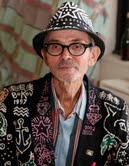
Free is an "art" film, in two ways. It is about an artist, and is filmmaking as art as well. Produced and directed by Mark Lechner, this forty-minute film introduces the viewer to the art of Konstantin Bokov, a "mad" Russian. For decades Bokov has been scouring the streets and byways of New York City in search of raw materials for his art, which is made from the items he finds. He then displays his creations in ad-hoc "galleries," wherever he deems appropriate. He welcomes admirers of his work to take possession of them for free, and some people become avid collectors. In addition, Bokov does have traditional gallery representation, which allows him to make a bit of money, and he has a following among the gallery crowd.
Bokov is one of those harmless and enhancing "characters" that provided New York with its "soul" (and who were so much more evident prior to the 1980s, when the single-room-occupancy apartment buildings which housed such folk were turned into luxury housing). Today, these once charming and reasonably hygienic characters have been replaced by unkempt outpatients apparently forgetting to take their meds, or free spirits slumming on a trust fund -- neither variety leaving us any art upon which to ponder, enrich, and/or amuse us.
Mr. Lechner's film ambles at a relaxed pace, one which mirrors Bokov himself as he is shown unhurriedly going about New York City from the parks of Washington Heights to Soho to the Meatpacking district, finding materials and fashioning them into the unpredictable. As the film progresses, Bokov seems to take on the embodiment of the narrator of The Little Prince by Saint-Exupéry, who as a child draws a boa constrictor digesting an elephant -- but all the adults just see a hat. This "adult" shortsightedness stopped the narrator from being an artist -- but nothing stops Bokov. Mr. Lechner shows that Bokov's delight in his art is endless, and is truly contagious. One of his neighbors calls Bokov the "mayor of art" for Washington Heights. A city park manager spares a tree stump from removal because it is one of Bokov's customary "galleries." City dwellers (and visitors) delight in unexpectedly coming upon his creations.
Bokov is a driven artist but in no way a lunatic. Archival footage shows him in 1982, seven years after his arrival from Russia, being interviewed along with his young son. The video shows a reasonable, even handsome family man, as he tells of leaving Russia and his perspectives on art. Later we are introduced to his beautiful wife Ludmilla, who tells that she "had to be apart" from Bokov, but quickly adds that he has to have his art on her walls, and that his work warms her heart and gives her energy. That seems to be the universal effect of Bokov's artistry. Apropos of this, there are two exceptional scenes in which Bokov gives art classes to young students at a neighborhood Catholic school. The beaming delight on his face, and the enthusiasm of these students, are utterly inspirational.
To characterize Mr. Lechner's filmmaking style, Free is the cinematic equivalent of a poem in praise of an artist and New York -- a city that both provides him with his materials and has the capacity to honor and treasure him. His admirers include gallery owners, accomplished artists, and the anonymous people who stop to gaze at his creations. In a mystical sense, one might even say New York City embraces him. There are dreamy scenes and sequences where the city of New York seems to have been created as a backdrop specifically for Bokov, so that he could explore and draw artistic resources from it.
Throughout Free, Mr. Lechner is exceptionally adept at utilizing the full visual vocabulary of filmmaking. I could imagine a tenured professor of film aesthetics conducting a class in which he or she shows the film shot-by-shot, discoursing on the setups, the contents of each shot, the angles, the lighting, the rhythm of editing and its variations, the perspectives, pointing out shades of meaning, contrasts, intentional ambiguities, etc.
Moreover, Free has a wonderful soundtrack which perfectly resonates with the images/action, and carries the viewer from scene to scene with grace. The musical compositions, arrangement, and production are credited to Gordon Bannier, Oliver Schwarz, and Florian Siegmund. The superb upright bass, sometimes in solo mode, is played by Felix Weigt. Some of the music also has a gentle whimsy which well fits the spirit of Bokov, and if I'm not mistaken the instrumentation includes accordion, xylophone, dulcimer, guitar, keyboard, drums, and Mr. Weigt's bass.
Free will be shown on Monday, January 7, 2013 at 6:00pm at New Filmmakers New York in the Courthouse Theater at Anthology Film Archives, 32 Second Avenue (at Second Street).
